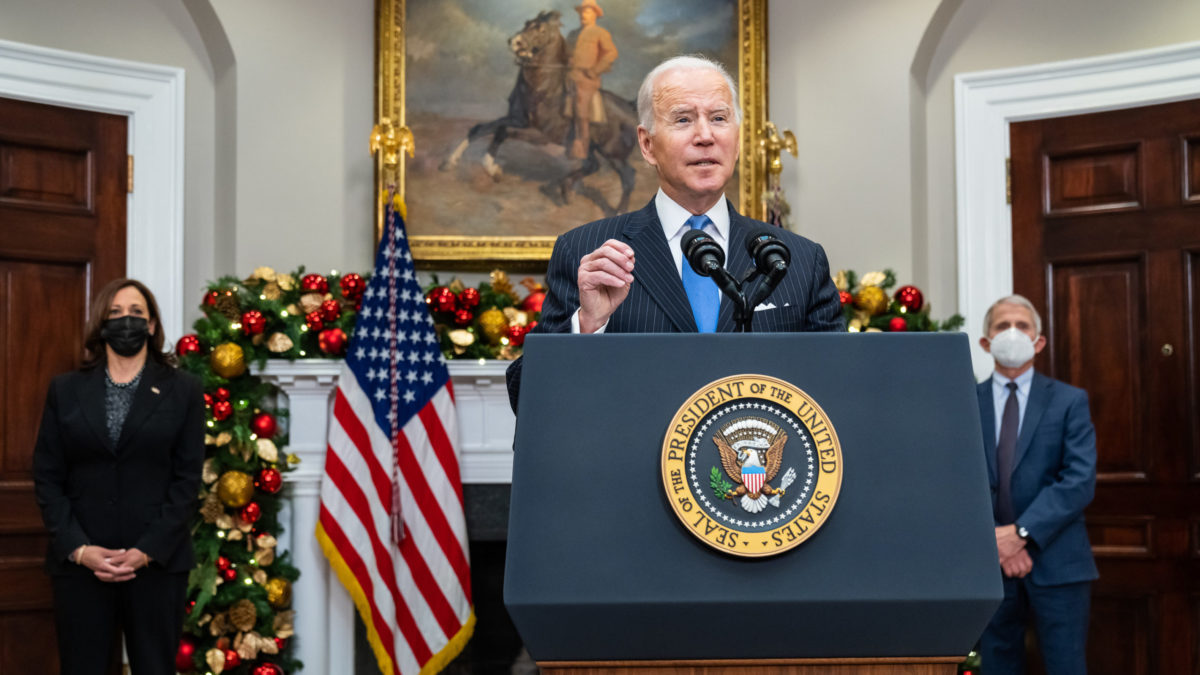President Joe Biden is handing Americans a massive lump of coal this Christmas.
Where to begin? The United States is marred by the highest inflation in nearly 40 years while experiencing a seven-year high on gas prices. The country’s citizens grapple with a seemingly open southern border policy, a looming COVID-19 vaccine mandate to punish the “unclean,” and an unprecedented supply-chain crisis that one chief economist told the Wall Street Journal he does not see ending until at least 2023.
The total Christmas price index, the cost of each of the gifts from “The Tweleve Days of Christmas,” has risen 5.7 percent relative to 2019 — marking the most significant surge in eight years — according to figures from PNC Financial Services. The producer price index reached a record high in November, rising 9.6 percent. Stock futures are tumbling, and gold is inching higher. Skepticism has led to hoarding of cryptocurrency to escape the central banking system.
AAA’s year-end travel forecast indicated about 109 million Americans will travel this Christmas. This marks a 34 percent increase from last year. While most will be driving and grappling with the more than $1.25 per gallon increase at the pump, more than 6 million will fly and 3 million will take a train, bus, or cruise. Airfare is through the roof, at 5 percent more from last year, and car rentals are up 65 percent for New Year’s.
Our economy is sinking. And Americans have taken note. According to an ABC and Ipsos poll released in early December, 57 percent of people give Biden a thumbs down on his handling of it. This number has increased 19 points from March. A mere 28 percent of Americans approve of the president’s handling of inflation and 69 percent disapprove. Only 54 percent of Democrats approve.
Mark J. Perry, a University of Michigan economics professor, expressed to me the correlation between rising inflation and a recession. Nearly every other time consumer inflation was above 5 percent and surging — the U.S. economy was either in a recession or heading toward one, he noted.
“The recent surge in inflation has exceeded gains in workers’ income and has therefore reduced Americans’ real income in inflation-adjusted terms, which is gradually lowering the standard of living of the average U.S. household,” said Perry. “Consistent with the historical relationship between rising inflation and U.S. recessions, falling real wages have almost always happened either during a recession or preceding a pending recession. Therefore, with rising inflation and falling real wages, Biden’s failed economic policies and mismanagement may be moving the U.S. economy toward a recession in 2022.”
Meanwhile, the administrative state waves away the problems afflicting the American people. So the thought process goes, it is the unvaccinated who have “put our economy at risk,” as Biden said at an Illinois construction site in October. Jeff Zients, the White House coronavirus response coordinator, echoed this point last week in a press briefing.
“For the unvaccinated, you’re looking at a winter of severe illness and death for yourselves, your families, and the hospitals you may soon overwhelm,” said Zients.
The “pandemic of the unvaccinated,” as Democrats assert, is rarely mentioned in conjunction with decisions that have contributed to economic turmoil: harsh government lockdowns, perpetual unemployment benefits, and the raising of federal salaries for nearly two million employees while Americans struggle to put food on the table.
Dr. Rick Geddes, a Cornell University economics professor and senior fellow at the American Enterprise Institute, told me he thinks the economic situation is like nothing we have ever seen before due to there being so many factors at play. He pinpointed the impact of lockdowns and the unusual state of the labor market, given many people retired during the coronavirus.
“We’ve never had this sort of policy,” said Geddes. “We’ve never had a case where the government said, ‘we’re going to shut down businesses and you can’t go to work.’ It’s an enforced recession. It’s not caused by some underlying economic force. It’s caused by government policy. And now we are in a situation where we have to see firsthand how the economy is going to recover because of all these unintended consequences.”
The Senate has adjourned for the year but, amid economic chaos, Biden still wishes to pass a $5 trillion spending spree that Federalist Senior Contributor Christopher Jacobs rightly called “Build Back Bankrupt.” The Congressional Budget Office estimates it will add $3 trillion to the deficit — but Senate Majority Leader Chuck Schumer, D-N.Y., no doubt aims to try and persuade Sen. Joe Manchin, D-W.V., and other moderates to bow down to unchecked progressivism next year. Biden’s plan is coined “Build Back Better,” and surely this could not be a more inconsistent framing.
The gaslighting continues. According to White House press secretary Jen Psaki, it would be “unfair and absurd” for U.S. companies to charge consumers more should the Democrats’ higher tax rates pass. The administration, then, seeks to kneecap businesses in the worst way since 1968 — when the largest tax increase was last made — and beg them to forfeit funding in the name of an overbearing and unchecked government. It is plainly irresponsible.
“These are the same people who tell you there will be no serious trade-offs when greening the economy and artificially spiking energy prices,” National Review’s David Harsanyi wrote in September on the Psaki remarks. “Good and services do not spring forth from the ether without costs simply because voters are big fans of windmills and community college.”
Asked in the briefing room last week about Biden’s relationship with Manchin, Psaki said, “He is committed to pressing forward through ups and downs and that’s where we are right now.”
With Christmas less than a week away, indeed the economy is experiencing major “downs.”
“We’ll be facing a lot of uncertainty in 2022 because of all these policies,” Geddes said. “Remember, the shutdowns were only supposed to last a few weeks. And then it went from weeks to months, and it really has had a huge dislocating effect on the economy. We’re going to have to see how that unfolds in 2022.”
Democrats have yet to take seriously the effects of their COVID-19 policies on everyday Americans. Or perhaps they have thought long and hard about it and simply do not care. Expanding government and limiting financial mobility has taken its toll, nonetheless.
Both will continue to be felt from California to Maine on December 25.








